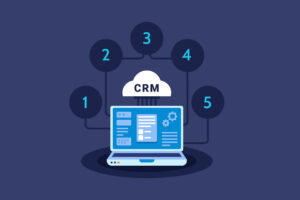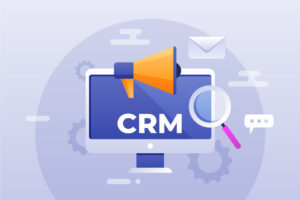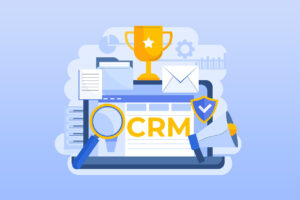Customer Relationship Management (CRM) is the business practice of managing and tracking all interactions with contacts. A CRM software is a technology that allows you to clearly define, manage and ultimately automate this business practice.
It’s safe to say that the customer relationship management industry has had a transformative journey to get to where it is today. Originally, one would look to CRMs for manual documentation and a central data house. But now, CRM tools are classified as advanced digital innovations.
Automated CRM tools are continually innovating to allow users to build robust automation processes, workflows, and pipeline management. In other words, CRM tools, through automation features, now help to streamline things like customer-related tasks and drive significant business growth.
From improving customer experience to enhancing data analysis and decision-making, the impact of CRM automation on business growth cannot be underestimated. Below are some of the areas CRM automation can help your business grow.
5 Areas CRM Automation Can Help Your Business Grow

1. Lead Management
CRM automation helps optimize lead capturing, qualifying, and nurturing processes. This usually leads to improved accuracy in lead management and ultimately results in higher conversion rates and sales.
2. Customer Service
Utilizing the features of a CRM automation tool can enhance your business’s ability to deliver prompt and personalized customer service. You’ll be able to automate routine tasks such as answering recurrent inquiries, organizing support requests, and sharing relevant data with clients. A CRM tool helps maintain a centralized customer information database, which allows sales personnel to effectively address your customers’ concerns.
With an integrated CRM, businesses can access all information such as invoices, past communication, etc., quickly and respond to customer inquiries in a timely and personalized manner. This not only improves customer satisfaction but also enhances operational efficiency.
3. Sales Management
CRM automation can help your sales teams close deals faster by automating time-consuming tasks such as data entry, appointment scheduling, and follow-up reminders. This helps sales teams to focus on more strategic activities that can drive growth.
4. Marketing Automation
CRM marketing automation can help you target the right audience, personalize marketing campaigns, and increase engagement within marketing channels. Most CRM tools integrate with third-party marketing tools including email marketing, social media, and advertising platforms.
5. Data Analysis
CRM automation can also provide valuable insights into customer behavior and preferences, providing what it takes for you to make data-driven decisions that can improve customer experiences and drive growth. In addition, CRM tools help with predictive analysis, reports, and customer tracking, providing valuable insights into future customer behavior and needs. This informs new product development, marketing strategies, and sales efforts.
Other Benefits of CRM Automation

1. Enhanced operational efficiency
An automated CRM encourages better cross-department collaboration among sales, marketing, service, and operations teams by providing a 360-degree view of the customer. This births seamless information sharing and data-driven decision-making, resulting in improved operational efficiency.
2. Better data management
Automated CRM systems are designed to help organizations efficiently manage customer interactions and relationships. By centralizing customer data into a single repository, these systems provide a comprehensive view of each customer and their interactions with your organization. You’ll be able to properly analyze customer interactions, identify patterns and trends, and respond to customer needs in a timely and effective manner.
3. Increased sales
CRM automation can play a key role in driving business success by streamlining your sales process and helping you close deals faster and more effectively. With the right data, you can tailor your sales pitch and approach accordingly. This results in more targeted, effective sales presentations and a higher likelihood of closing deals.
Types of CRM Tools

Industries and teams have unique requirements and challenges that can be better addressed by CRMs specifically designed for their needs. Below are some:
1. Sales-focused CRMs
These are designed to help manage a sales pipeline, track customer interactions, and close deals. These CRMs are commonly used by businesses in industries such as software, finance, and consulting. They provide a centralized platform for sales teams to manage their prospects, communicate with customers, and close deals more effectively.
2. Marketing-focused CRMs
These CRMs are designed to help marketing teams manage campaigns, track customer behavior, and generate leads. Businesses commonly use them in industries such as e-commerce and retail. They also tend to provide a centralized platform for marketing teams to manage their campaigns and understand their audience.
3. Service-focused CRMs
These CRMs are designed to help service teams manage customer support, track customer issues, and resolve problems. Healthcare, telecommunications, and energy industries use Service-focused CRMs as they provide a centralized platform for service teams to manage customer interactions, streamline communication, and improve the customer experience.
4. Non-profit CRMs
These CRMs are designed specifically for non-profit organizations. They help non-profit organizations manage their donor and supporter relationships, fundraising efforts, and volunteer programs. They also provide a centralized platform for non-profits to manage their operations, communicate with their supporters, and track the impact of their work.
5. Real Estate CRMs
These provide a centralized platform for real estate professionals who want to manage all aspects of their business. With features such as filtered property listings, real estate agents can easily manage and showcase their listings to potential clients. Additionally, real estate CRMs often integrate with other tools and systems, such as property appraisal software and email marketing platforms. They help agents manage all aspects of their business from one centralized location.
In all, most CRM tools allow integrations with other third-party tools and plugins. So you can always sync other useful business tools with your CRM to meet your specific needs.
How to Choose the Right CRM Automation Tool

Choosing the right CRM automation tool can make or break your business’s success in managing customer relationships. With so many options available, it can be difficult to know where to start. Don’t worry–we got you.
Below are some key steps to take before choosing the right CRM automation tool for your business:
1. Identify Your Business Needs
Before you start looking at CRM tools, it’s important to understand what your business needs. What kind of customer data do you want to collect? How will you use that data? What processes do you want to automate? Answering these questions will help you determine what features you need in a CRM tool.
2. Understand the Implementation
Implementation is a crucial aspect of introducing new software or making changes to existing systems. You may want to hire a business process consultant or designate an internal staff member who will oversee the deployment and implementation. During this phase, there will be training sessions and testing periods to resolve technical issues and establish best practices.
Even if you didn’t incur external costs while implementing a new CRM automation tool, educating your team will come at a cost. These costs can be substantial and may require a significant amount of time, so it is important not to underestimate the impact of the implementation process.
3. Prepare For User Adoption
Regardless of the system you choose, there may be members of your team who are resistant to change. Sales teams are often concerned about losing control over their customers’ contact information and feel threatened by new systems.
To address these concerns, it is vital to involve the sales team in the CRM selection process and keep them engaged throughout the implementation process. By doing so, you can help them feel more confident about the new CRM automation tool and reduce the risk of resistance. It is also crucial to reassure your sales team that they will not lose control over their customers, as they own the personal relationship with their clients.
4. Understand Product Mobility
Mobility is crucial in today’s fast-paced world. Your sales team needs to be able to access your new CRM automation tool from various devices, including phones, tablets, and laptops. So, choose a tool that is accessible on different web-enabled devices. Also, keep in mind that salespeople are tech-savvy, so choose a platform that is regularly updated and keeps up on the latest technologies.
5. Layout Your Processes and Consider Flexibility
It’s important to have a flexible CRM that can handle your unique business processes. Every company has different processes, and this sets you apart from your competitors. Ensure the CRM you choose is flexible and can adapt to your changing processes without needing to be replaced.
6. Review Compatibility With Current Software
Make sure the CRM automation tool you’ll adopt is compatible with other software you already have in place. Though compatibility is becoming less of a concern with more and more applications connecting through APIs, it’s still advisable to check. If you need assistance integrating your systems through APIs, look for a third-party services team to streamline your data organization.
7. Take a Deep Dive into the Product Demo
Ensure you have access to a product demo and take advantage of the opportunity to test it thoroughly. Try to push the limits of the demo and see how the system performs under stress. This is your chance to evaluate the strengths and weaknesses of the system for your business needs. Avoid the mistake of assuming the system will work based on a glance. Spending more time during this stage will pay off in the long run.
8. Inquire About Reporting Features
While a CRM’s functionality is important, its reporting capabilities can give you a competitive edge. The ability to create customized reports based on your unique data can highlight your successes, failures, and areas for improvement.
Your processes may seem effective, but your data may reveal otherwise. When your sales team inputs accurate customer data, you’ll get to determine the best products, services, pricing, and delivery methods for your business.
In a nutshell, a CRM automation tool can be very instrumental in growing and managing your business, so use the steps above to choose the right one.
In a nutshell…
CRM automation is no doubt a powerful tool for businesses looking to drive growth, improve customer satisfaction, and streamline operations. With its ability to automate repetitive tasks, provide real-time data and insights, and foster better collaboration among teams, CRM automation has become an indispensable asset for businesses of all sizes. While there are many options out there, choose the one that provides answers to your specific needs.
And, if you’d like to work with an external expert to ensure that your team is maximizing the features of your CRM automation tool, schedule a free consultation with us today.


